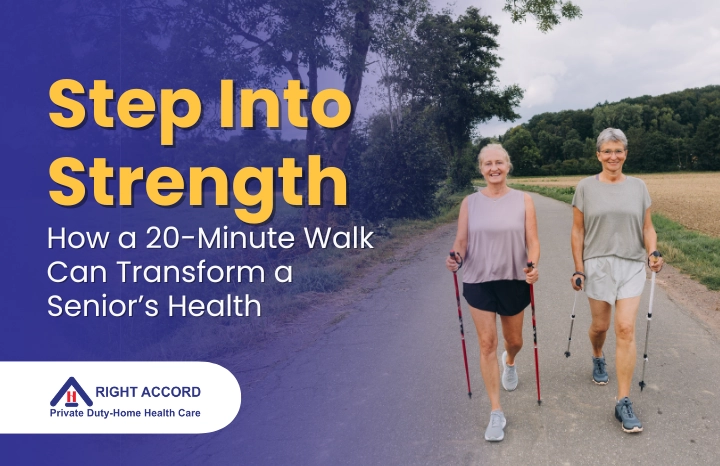· 4 min read
Step Into Strength: How a 20-Minute Walk Can Transform a Senior’s Health
Sometimes, the simplest things make the biggest difference. In a world of high-tech health gadgets and complex care plans, one timeless activity continues to deliver incredible results—walking.

For seniors, a 20-minute daily walk isn’t just exercise—it’s a wellness practice that improves physical health, sharpens the mind, boosts mood, and restores independence. Best of all? It’s free, easy, and low-impact.
Whether done around the block, at a park, or inside the house, the power of walking can’t be overstated. In this blog, we’ll explore why walking is one of the most effective and accessible health tools for older adults.
🩺 The Physical Benefits of a Daily Walk
- Improves Heart Health Walking strengthens the heart by increasing circulation and lowering blood pressure. Just 20 minutes a day can reduce the risk of heart disease and stroke—two of the most common health concerns in seniors.
- Supports Joint Health and Reduces Stiffness Regular walking lubricates the joints, easing stiffness caused by arthritis and inactivity. Unlike high-impact exercise, walking is gentle and encourages natural joint movement.
- Strengthens Muscles and Bones Walking improves balance and strengthens lower-body muscles, helping prevent falls. It also boosts bone density, which is crucial in preventing fractures.
- Enhances Digestion and Blood Sugar Control Walking after meals helps regulate blood sugar, particularly important for seniors managing diabetes. It also supports digestion and reduces bloating or discomfort.
🧠 The Mental & Emotional Benefits of Walking
- Boosts Mood and Reduces Anxiety Walking triggers the release of endorphins—feel-good hormones that help ease stress and improve emotional well-being. It’s a natural antidepressant.
- Sharpens Memory and Cognitive Function Studies show that walking enhances brain function, slows cognitive decline, and may reduce the risk of Alzheimer’s disease.
- Encourages Mindfulness Walking outdoors promotes awareness and grounding in the present moment, which can improve mental clarity and reduce worry or confusion.
- Increases Social Engagement Joining a walking group or simply waving at neighbors during a walk creates opportunities for connection—important for seniors facing isolation.
💡 20 Minutes a Day: The Sweet Spot
Why 20 minutes? Because it’s manageable for most seniors and provides significant health benefits without fatigue or overwhelm.
Here’s what 20 minutes can do:
- Burn calories and manage weight
- Improve circulation and stamina
- Reset mood and energy levels
- Support restful sleep at night
Even 10 minutes twice a day counts. The key is consistency.
📋 Safety Tips for Seniors While Walking
At RIGHT ACCORD, we always prioritize safe mobility. Here’s how seniors can walk confidently:
- Wear supportive shoes with non-slip soles
- Use a cane or walker if needed for balance
- Choose flat, well-lit paths (indoors or outdoors)
- Stay hydrated and avoid walking during extreme heat
- Let someone know before heading out or walk with a buddy
Need help? Our caregivers at RIGHT ACCORD are trained to assist with safe walking routines and mobility support.
🌳 Walking Indoors vs. Outdoors
Outdoors
- Fresh air and sunshine boost vitamin D
- Changing scenery stimulates the mind
- Nature has calming effects on the nervous system
Indoors
- Great for rainy, cold, or hot days
- Mall walking or hallways in senior communities are excellent choices
- Safer for those at risk of falls or who require assistance
A mix of both can keep things interesting and sustainable.
📅 How to Make Walking a Daily Habit
- Schedule it: Make it a fixed time of day—like after breakfast or before dinner
- Track progress: Use a pedometer or app to count steps
- Walk with a purpose: Stroll to the mailbox, the garden, or to call a friend
- Make it fun: Play music or listen to an audiobook
- Celebrate milestones: Small wins (like walking 5 days in a row) deserve recognition!
💬 Stories from Our Seniors
At RIGHT ACCORD, we’ve seen firsthand the difference walking makes in our clients’ lives. One of our clients in Sarasota started with a 5-minute walk in her driveway. Three months later, she walks 25 minutes every morning with her caregiver—and her doctor cut her blood pressure meds in half.
Another client in Manatee County reports fewer mood swings and better sleep after adding two 10-minute walks daily to his routine. These stories aren’t rare. They’re proof that consistency builds results—and confidence.
✅ A Sample Walking Routine for Seniors
- Week 1: 5 minutes a day, indoors or in the yard
- Week 2: Increase to 10 minutes, once or twice a day
- Week 3: Aim for 15–20 minutes with a short rest break
- Week 4+: Maintain 20 minutes daily or more if comfortable
Include gentle stretches before and after to prevent soreness.
🏡 How RIGHT ACCORD Supports Senior Mobility
Whether it’s walking support, mobility planning, or simply companionship, our team at RIGHT ACCORD Private Duty – Home Health Care is here to help your loved one move more and live better.
We serve seniors across Sarasota, Venice, Manatee, Lee, and Charlotte Counties, offering compassionate in-home care that encourages independence.
📞 Call us at 941-366-0801
🌐 Visit www.rightaccordhealth.com
Let us walk alongside you, every step of the way.
🧓 Final Thoughts
Walking is not just an exercise—it’s a statement of vitality, independence, and purpose. A simple 20-minute walk each day can bring strength to the body, peace to the mind, and joy to the heart.
Let’s help our seniors take those steps—one foot, one minute, one day at a time.



